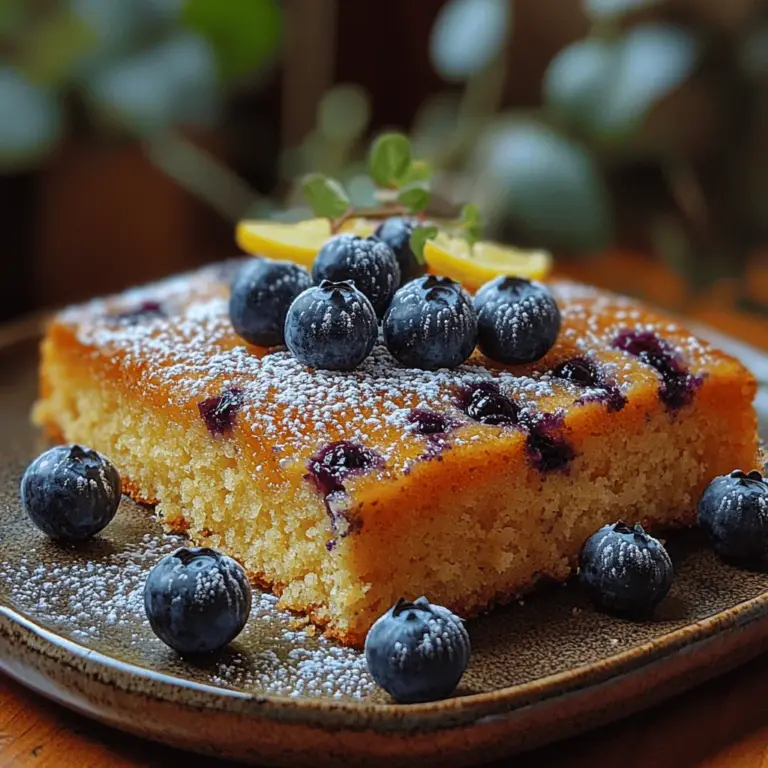Indulging in a slice of Blueberry Lemon Ricotta Cake is like savoring a bite of sunshine on a plate. This moist and flavorful cake combines the tangy zest of fresh lemons with the sweet burst of blueberries, all brought together with the creamy richness of ricotta cheese. The unique combination of flavors and textures makes this cake not just a dessert but an experience that delights the senses. Whether you’re hosting a brunch, celebrating a special occasion, or simply treating yourself, this recipe promises to impress both your palate and your guests.
The origins of this delightful cake can be traced back to the classic Italian dessert traditions, where ricotta cheese is often used to add moisture and richness to baked goods. The addition of blueberries and lemon elevates it further, making it a perfect fit for any gathering. The vibrant colors and aromatic notes make this cake a visual and olfactory treat, sure to leave a lasting impression.
In this article, we will delve into the ingredients, step-by-step preparation, and the unique qualities that make this cake a must-try for baking enthusiasts. With generous amounts of fresh fruit, creamy ricotta, and zesty lemon, this cake is not only delicious but also packed with wholesome ingredients. Whether you’re an experienced baker or a novice in the kitchen, this recipe is manageable and rewarding.
Understanding the Ingredients
To craft the perfect Blueberry Lemon Ricotta Cake, understanding the role of each ingredient is essential. Each component contributes to the overall flavor and texture, ensuring that the cake is not only delicious but also achieves a desirable consistency.
Fresh Blueberries: The Sweet Burst of Flavor
The star ingredient of this cake is undoubtedly the fresh blueberries. When selecting blueberries, it’s crucial to choose high-quality, ripe berries. Look for those that are plump, firm, and deep blue in color, with a silvery bloom. This bloom indicates freshness and helps in preserving the natural sweetness of the fruit. Using frozen blueberries is an option, but fresh berries provide a superior flavor and texture, creating a burst of sweetness in every bite.
Ricotta Cheese: Moisture and Richness
Ricotta cheese plays a significant role in this recipe, adding both moisture and richness to the cake. Unlike other cheeses, ricotta has a mild flavor and a creamy texture, which blends beautifully into the batter. This ingredient not only enhances the cake’s moistness but also contributes to its tender crumb. When choosing ricotta, opt for whole milk varieties for the best flavor and texture. If you can, use fresh ricotta from a local dairy or specialty store, as it will deliver the richest taste.
Role of Sugar: Sweetness and Flavor Enhancement
Sugar is a fundamental ingredient in any cake recipe, and in the Blueberry Lemon Ricotta Cake, it serves multiple purposes. Not only does it sweeten the cake, but it also interacts with the other ingredients to create a balanced flavor profile. The sugar helps to tenderize the cake, contributes to browning during baking, and enhances the overall flavor. For this recipe, granulated sugar is typically preferred, but you can experiment with alternatives like coconut sugar or honey for a different sweetness profile.
Unsalted Butter: The Foundation of Flavor
Butter is a crucial component, providing richness and flavor to the cake. Unsalted butter is recommended as it allows you to control the overall saltiness of the cake. The quality of butter matters; choose a high-fat content butter for the best results. The creaming process, where butter and sugar are beaten together, creates air pockets that contribute to the cake’s rise and texture. Make sure your butter is softened to room temperature for optimal creaming.
Lemon Zest and Juice: Bringing Brightness to the Cake
Fresh lemon zest and juice are essential for infusing the cake with a bright, citrusy flavor. The zest contains aromatic oils that enhance the cake’s fragrance and add a vibrant taste, while the juice provides acidity that balances the sweetness. Always use fresh lemons for the best flavor; bottled lemon juice lacks the freshness and brightness that fresh juice provides. When zesting, be mindful to only take the outer yellow layer of the peel, avoiding the bitter white pith beneath.
Vanilla Extract: Depth of Flavor
Vanilla extract is often considered the secret ingredient in many desserts, and for good reason. It adds depth and complexity to the flavor profile of the Blueberry Lemon Ricotta Cake. Use pure vanilla extract for the most authentic flavor, as imitation vanilla can leave a synthetic aftertaste. A splash of vanilla enhances the overall sweetness and complements the fruity and citrus notes beautifully.
Flour and Baking Agents: The Structure of the Cake
The flour you choose plays a pivotal role in providing structure to the cake. All-purpose flour is commonly used in cake recipes due to its balanced protein content, which yields a tender crumb. However, you can experiment with cake flour for an even lighter texture. Baking powder is the leavening agent that helps the cake rise, so ensure it is fresh for optimal results. The combination of flour and baking agents creates a stable structure, allowing the cake to hold its shape while remaining moist.
Preparation Steps in Detail
Now that we have a clear understanding of the ingredients, let’s move on to the preparation steps that will guide you in making this delectable Blueberry Lemon Ricotta Cake.
Prepping for Success: Preheating and Equipment
Before diving into the mixing and baking, it’s important to prepare your workspace and preheat your oven. Preheat your oven to 350°F (175°C) to ensure an even baking temperature. While the oven is heating, gather your equipment and ingredients. You will need a 9-inch round cake pan, mixing bowls, a whisk, a spatula, and measuring cups and spoons.
Tips for Greasing and Flourishing the Cake Pan
Greasing and flouring the cake pan is a crucial step to ensure that your cake releases easily after baking. Begin by generously buttering the bottom and sides of the pan using softened unsalted butter. After greasing, sprinkle a light layer of flour over the buttered surface, tapping out any excess. For added security, you can also line the bottom of the pan with parchment paper. This not only makes for easy removal but also helps prevent the cake from sticking.
Coating the Blueberries: Preventing Sinking
One common challenge when baking with fresh blueberries is that they tend to sink to the bottom of the cake while baking. To prevent this, you can toss the blueberries in a small amount of flour before adding them to the batter. This technique creates a light coating on the berries, helping them stay suspended in the batter during baking. Not only does this prevent sinking, but it also contributes to a nice texture in the final product.
Creaming the Butter and Sugar: Achieving the Perfect Consistency
Once your ingredients are prepped and your oven is preheating, it’s time to start making the batter. In a mixing bowl, combine the softened unsalted butter and granulated sugar. Using an electric mixer or a whisk, cream the butter and sugar together until the mixture becomes light and fluffy. This process usually takes about 3-5 minutes. You’ll know it’s ready when the mixture has doubled in volume and has a pale, buttery color.
Incorporating Eggs and Ricotta: Creating a Smooth Batter
After achieving the perfect creamed mixture, it’s time to incorporate the eggs and ricotta cheese. Add the eggs one at a time, mixing well after each addition. This step is crucial as it allows for better emulsification, resulting in a smoother batter. Once the eggs are fully incorporated, add in the ricotta cheese. Mix until the batter is smooth and well-combined, ensuring there are no lumps. The ricotta will add moisture and richness, which are essential for the cake’s delightful texture.
Infusing Flavor: The Role of Zest and Juice
Finally, it’s time to add the star flavors: fresh lemon zest and juice. Grate the zest of one large lemon, being careful to avoid the bitter white pith. Stir the zest into the batter, followed by the fresh lemon juice. This combination will provide the bright, zesty flavor that complements the sweetness of the blueberries perfectly. Mixing these ingredients into the batter should be done gently to avoid overmixing, which could lead to a denser cake.
In this first part of the article, we have explored the vibrant flavors and textures that come together to create the Blueberry Lemon Ricotta Cake. By understanding the role of each ingredient and following the initial preparation steps, you are well on your way to baking a cake that is sure to impress. Stay tuned for the next part, where we will continue with the remaining steps and tips to ensure your cake turns out perfectly every time.

The Balance Between Citrus and Sweetness in the Cake
Creating the perfect Blueberry Lemon Ricotta Cake is all about achieving the right balance between the tartness of lemon and the sweetness of the cake itself. The lemon zest and juice lend a refreshing brightness that cuts through the richness of the ricotta cheese, while the sugar complements the natural sweetness of the blueberries. This harmonious blend not only enhances the overall flavor but also elevates the cake’s appeal, making it suitable for any occasion.
Mixing Dry Ingredients: The Science Behind It
Before we dive into the mixing process, it’s crucial to understand the role that dry ingredients play in baking. The primary components of the dry mix for this cake include all-purpose flour, baking powder, baking soda, and salt. Each ingredient fulfills a specific function:
– Baking Powder and Baking Soda: These leavening agents are essential for helping the cake rise. Baking powder contains both an acid and a base and releases carbon dioxide when moistened and heated, which helps the cake achieve a light texture. Baking soda, on the other hand, requires an acid (like lemon juice) to activate it. Understanding this difference is vital for ensuring your cake has the right lift.
– Proper Mixing: When combining your dry ingredients, it’s important to whisk them together thoroughly. This will ensure an even distribution of the leavening agents, preventing any pockets of dense batter that can affect the cake’s texture. Additionally, be cautious not to overmix the flour with the wet ingredients, as this can lead to the development of gluten, resulting in a tough cake rather than the tender crumb we desire.
Combining Mixtures: Techniques for Best Results
Once your dry ingredients are prepared, it’s time to bring everything together. The technique you use for combining the wet and dry mixtures can significantly impact the cake’s final texture.
– Folding vs. Stirring: When incorporating the dry ingredients into the wet mixture, opt for the folding method rather than vigorous stirring. Folding gently allows for a delicate combination of ingredients without overworking the batter. Use a spatula to scoop from the bottom and fold over the top, turning the bowl as you go. This technique preserves the air bubbles created during mixing, which contribute to the cake’s lightness.
– Maintaining Moisture: To ensure your Blueberry Lemon Ricotta Cake remains moist, avoid overmixing. Stop mixing as soon as you see no dry flour left, and incorporate the ricotta and lemon juice in a way that keeps the batter airy. The ricotta cheese not only adds moisture but also richness, making every bite delightful.
Folding in Blueberries: Ensuring Even Distribution
One of the highlights of this cake is the burst of juicy blueberries in every slice. However, incorporating them can be tricky.
– Best Practices: When adding blueberries to the batter, do so gently. Toss them in a bit of flour before folding them in; this helps prevent them from sinking to the bottom during baking. Use the same folding technique as before to evenly distribute the blueberries without crushing them. This preserves their shape and ensures that each bite contains a perfect balance of cake and fruit.
– Visual Appeal: The visual effect of blueberries in the finished cake is truly stunning. As the cake bakes, the blueberries create a beautiful marbled effect that not only looks appealing but also signals the freshness of the ingredients used. The vibrant blue against the light yellow cake is a feast for the eyes and adds to the overall enjoyment of the dessert.
Baking Process: Timing and Techniques
With the batter ready, the next step is baking. Understanding the baking process is crucial for achieving the perfect texture.
– Oven Temperature and Baking Times: Preheat your oven to 350°F (175°C) before placing the cake in. This temperature is ideal for ensuring an even bake. Pour the batter into a prepared cake pan and bake for approximately 50-60 minutes. However, baking times can vary depending on your oven and the pan size.
– Signs That Indicate the Cake is Done: To check if the cake is done, look for a golden-brown top and gently press the center with your finger; it should spring back. You can also insert a toothpick into the center; if it comes out clean or with a few moist crumbs, your cake is ready to come out of the oven.
Cooling and Serving: Enhancing Presentation
After the cake is baked to perfection, cooling it properly is essential.
– Proper Cooling Techniques: Allow the cake to cool in the pan for about 10-15 minutes before transferring it to a wire rack. This prevents it from becoming soggy as it cools. Once on the rack, let it cool completely before slicing to maintain its structure.
– Garnishing and Serving: For an elegant finish, consider dusting the cooled cake with powdered sugar or serving it with a dollop of whipped cream. Fresh lemon zest or a handful of blueberries on top can enhance the presentation, adding color and flavor. If you’re feeling adventurous, a light lemon glaze drizzled over the top can elevate the cake to a new level of deliciousness.
The Unique Appeal of Blueberry Lemon Ricotta Cake
What sets the Blueberry Lemon Ricotta Cake apart from other desserts is its unique combination of flavors and textures.
– Flavor and Texture: The interplay between the tartness of the lemon, the sweetness of the blueberries, and the creamy richness of the ricotta creates a symphony of taste that excites the palate. The cake’s texture is moist and tender, with a delightful crumb that keeps you coming back for another slice.
– Versatility for Various Occasions: This cake is perfect for a variety of occasions, from casual afternoon tea to more formal gatherings. It pairs beautifully with coffee or tea, making it an ideal choice for brunches or dessert tables.
– Nutritional Benefits: Not only does this cake taste fantastic, but it also offers nutritional benefits. Blueberries are packed with antioxidants and vitamins, while ricotta provides protein and calcium, making this dessert a more wholesome option compared to traditional cakes.
Serving Suggestions and Pairings
To enhance your experience with the Blueberry Lemon Ricotta Cake, consider these serving suggestions.
– Ideal Beverages: Pair the cake with a refreshing beverage like lemon-infused iced tea or a crisp sparkling wine. The acidity in these drinks complements the cake’s flavors, creating a delightful balance.
– Creative Ideas for Plating: When serving, think about presentation. A slice of cake on a white plate with a small scoop of vanilla ice cream or a side of fresh berries can elevate the overall experience. Consider adding a sprig of mint for a pop of color and freshness.
Conclusion
The Blueberry Lemon Ricotta Cake is not just a dessert; it’s an experience that brings together the essence of fresh ingredients and the joy of baking. With its balance of sweet and tart flavors, coupled with a moist and tender crumb, this cake is sure to become a favorite in your baking repertoire. Whether enjoyed at a gathering or as a personal treat, each slice of this cake is a celebration of flavor that invites you to savor every bite. Embrace the joy of baking and delight your family and friends with this exquisite cake that beautifully showcases the delightful combination of blueberries and lemons, making every occasion special.

